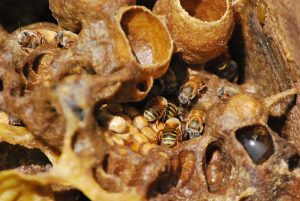
By Martha Lopez Huan
Merida, Mexico), Jun 29 (EFE).- Melipona bees produce a honey that the ancient Mayas considered sacred for its medicinal properties. Unfortunately, it is hard to find natural hives due to the deforestation that the Mayan jungles have suffered, so that now a large part of its production has been moved to urban areas.
Biologist Gretel Castillo told EFE that though it is “difficult to find natural melipona hives in the jungle due to the deforestation that drives their colonies away,” it is fortunate that young people’s interest in continuing that ancient tradition in the city grows day by day.
The melipona bee is characterized, among other things, by being stingless. In the Yucatan, according to the specialist, 2,949 hives of this type of bee have been recorded, and in which 87 beekeepers are at work in 24 municipalities.
Of the 47 bee species existing on the Yucatan Peninsula, the Melipona beecheii is most used for Mayan honey production.
“The chief characteristic of the melipona is that it is stingless and its honey is rich in nutrients and antioxidants with a high medicinal effectiveness that helps cure gastric ulcers, cataracts, conjunctivitis, carnosity, burns, cough, asthma and some respiratory ailments,” Castillo said.
At home she has a “jobon,” a hollow log the Mayas used as a hive and which, she said, is “worth its weight in gold.”
She also has 25 hives with five of the 47 bee species on the peninsula.
Castillo appeared more than happy that the younger generations have started taking an interest in producing melipona honey, which sells at a price between 1,200 and 1,500 pesos per liter ($57 to $71 per quart).
She also said the hives of the melipona bee range from Mexico to Costa Rica. Nonetheless, those on Mexico’s Yucatan Peninsula “are of the highest quality because the bees are found among healing flowers and fruit trees that blossom all year long.”
She discovered her love for these stingless bees thanks to Javier Quezada and Jorge Gonzalez, professors at the Autonomous University of the Yucatan (UADY)
Melipona bees are “very delicate” and, when no plants are flowering, they can’t be fed with sugar as other bee species can, which means they require the utmost attention.
Castillo, a specialist in agricultural parasitology, checks out her hives every week and cleans them to protect the “baby nests,” while taking care to see there is no infestation that could harm them.
